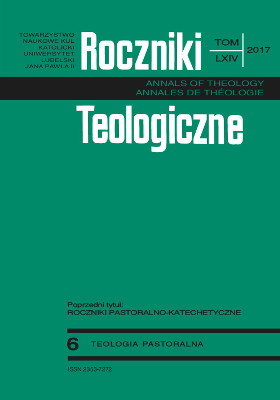The Dialogue of Believers in God with Non-Believers: The Challenge Facing by the Catholic Church in the New Century
The Dialogue of Believers in God with Non-Believers: The Challenge Facing by the Catholic Church in the New Century
Author(s): Eugeniusz SakowiczSubject(s): Christian Theology and Religion, Theology and Religion, Pastoral Theology
Published by: Towarzystwo Naukowe KUL & Katolicki Uniwersytet Lubelski Jana Pawła II
Keywords: dialogue; non-believers; believers; Church in Poland
Summary/Abstract: The Catholic Church in Poland faces various difficult challenges. One of them is the dialogue with people who declare their lack of faith in God. Modern atheism in Polish society is largely a consequence of the persecution of religion conducted for decades by the institutions of the Polish communist state. Current secular tendencies also have a significant impact. The phenomenon of the lack of faith is a challenge that necessitates new forms of pastoral work. The Church takes certain actions inspired, for example, by a document published by the Polish Episcopal Conference Council for Religious Dialogue in 2003, entitled “Dialogue: a Challenge for the New Century.” Part of the document refers specifically to “dialogue with non-believers.” Papal documents on atheism and non-believers provide guidance to priests and lay members of the Church. The Magisterium Ecclesiae has generated several practical recommendations for pastoral work. What is needed is a matter-of-fact, objective description of atheism and the lack of faith. It is necessary to initiate dialogue with non-believers at the doctrinal level, by listening carefully to their views; and at the practical level, by taking actions for the common good. The dialogue should be aimed at achieving a better knowledge of the other party, i.e. understanding the articles of faith on the one hand and, on the other, the theses and rationale behind the lack of faith.Only credible witnesses to the faith in God, those who believe by their own personal choice and conviction, can guide non-believers to the truth about God, Jesus Christ and human beings. The dialogue with non-believers is difficult due to strong non-rational prejudice, e.g. emotional bias, trauma, resentment and aggressive media propaganda against religion. However, one should not give up attempts at dialogue and communication. The imperative of the dialogue stems from Jesus Christ, Son of God who, by assuming human nature, entered the state of dialogue with every human being, both believers and non-believers.
Journal: Roczniki Teologiczne
- Issue Year: 64/2017
- Issue No: 6
- Page Range: 27-39
- Page Count: 13
- Language: English

